Discussing politics in the workplace can sometimes escalate to a more serious problem and harm overall productivity. Therefore, more and more organizations are implementing a political expression policy to keep the workplace environment peaceful and respectful. The idea of a political expression policy is to define a set of rules that employees need to follow irrespective of their position in the organization. As per our research, employees and HR experts, both have their own perspective on the impact of having a political expression policy at the workplace.
Now when the presidential election is around the corner, political discussions are bound to happen among the colleagues. Employers implement a political expression policy as a means to curtail any possible disagreements among the employees. As sometimes employers include a social media policy at work as a part of this policy, there is a mixed reaction among the employees regarding its implementation.
On the other hand, the HR experts/top management personnel also recognize the pros and cons of implementing such a policy. While a social media policy for companies can save an organization from landing in legal trouble, it can also backfire. The employees may start feeling that the authorities are intruding in their personal lives. If an organization doesn’t have an in-house HR team, they can consult any of the HR outsourcing services to implement a balanced political expression policy.
Goodfirms surveyed 126 employees & 40 HR experts worldwide to know their opinion on the implementation and effectiveness of political expression policy.

What is Political Expression Policy?
Political expression policy is actually a guideline for employees about political discussions that are acceptable/unacceptable in the workplace. The policy will not only help maintain a peaceful work atmosphere but also protect the employers against any legal issues. Moreover, the policy will also state the course of action for employees who face any discrimination due to their political opinions.
Most Employees Don’t Feel the Need for a Political Expression Policy at Workplace
As per employees’ responses to our research, 21.43% of them feel that an organization should have a political expression policy and 28.57% of them said that their companies have such a policy in place.

Samantha Moss is one of those employees who favor and also have a political expression policy at their workplace. She is the Editor & Content Ambassador at Romantific. Even though she works independently now, her previous company had a political expression policy. Samantha said, “And yes, the company where I worked before had a political expression policy. I think companies should have a political expression policy because it outlines what political conversations can or cannot have in the workplace.”
On the other hand, there are also 71.43% of employees whose company does not have a political expression policy. 50% of employees don’t feel the need to have a political expression policy. The reason being everyone in an organization should know how to respect each other’s opinions.
Jesse Silkoff is the Founder of MyRoofing Pal. Jesse didn’t feel the need for political expression policy in a small company. He said, “As the owner of a small online company, we haven't felt it is necessary to have a political expression policy. I don't like the idea of formally limiting what my employees can or can't say at work.”
Not to forget, there are also employees who are unsure about whether or not a company should have a political expression policy. Robin Madelain from Ranksoldier International Pvt Ltd is among the 28.57% of such employees.
Robin is a Content Outreach Executive at Ranksoldier International Pvt Ltd. “Although we are unsure about having a political expression policy at our office, an employee has a complete right to convey his political ideologies without generating hostility towards his coworkers,” said Robin.
Employees Cite "Freedom to Express" as the Main Reason
Today, most of the employees don’t mind having a political discussion at the workplace as long as it is respectful. As per our research, 42.86% of employees said that a workplace should give them the freedom to express their opinion. A political expression policy will restrict their freedom to express opinions on political events.
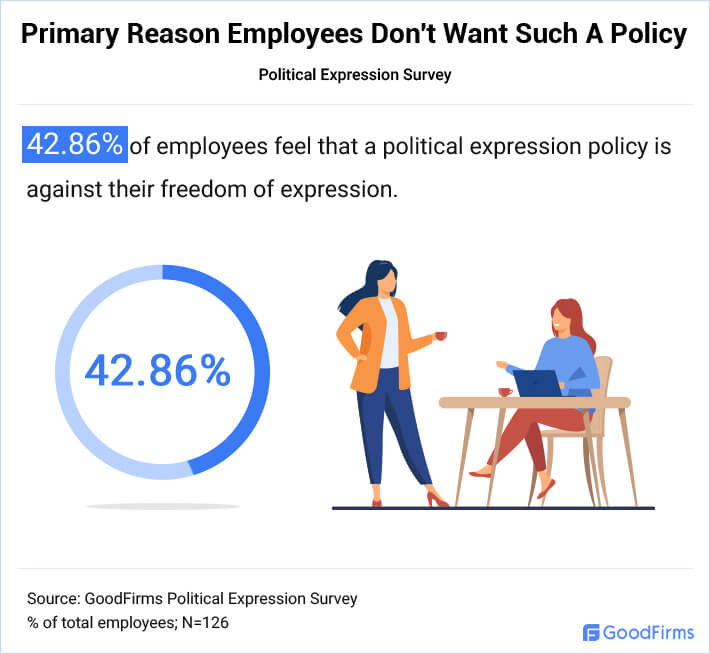
The Editor at Etia, Jennifer Willy, personally thinks there is no need for such a policy. Jennifer said, “I personally don’t think there is a need for one as no restrictions or curtailment of expression in the office. Everyone is free to profess their political thought but we all have our differences in opinions.”
Lewis Keegan, Founder of SkillScouter also thinks that freedom of speech should not be restricted if everyone is presenting their viewpoints in a peaceful manner. “I believe that a person's freedom of speech shouldn't be restricted in the workplace, as long as a person airs their sentiments in a peaceful manner and as long as they are not stepping on the rights of other people,” said Lewis.
HR Professionals Deem the Policy as Essential for Workplace
When it comes to handling employees related problems, it falls on HR team/management. So, it is only apt that in political expression policy research, the opinion of HR/management is also taken into consideration. While employees don’t feel the need of having such a policy in place, 60% of HR experts feel that a political expression policy is necessary at the workplace.
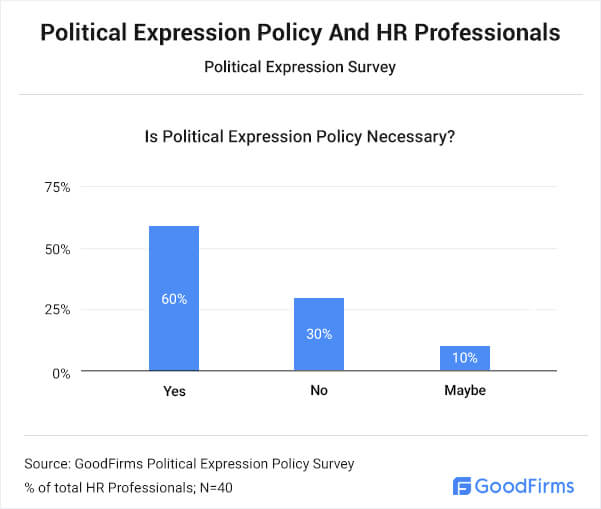
Laurie Wilkins is the founder of Call Outdoors. Laurie said, “In my opinion, political expression policy is essential in a workplace. One's political view is a topic that's honestly better be outside the box and not be discussed during working hours.”
Tom Winter agrees with the opinion of Laurie Wilkins. He is the Co-Founder of DevSkiller. “I would say yes since it needs to be explicitly stated in order to avoid any unnecessary conflict in the workplace. The policy should be introduced to new employees as part of the onboarding process,” said Tom.
While, about 30% of HR experts even believe that if the employees understand the boundaries of political discussions in the workplace, there is no need for such a policy.
Yet, there are also some people at the management level who are not sure about the necessity of political expression policy. These people constitute 10% of the total respondents.
Scott M. Behren is one of them. Scott from Behren Law Firm says, “Not sure for a hostile workplace, but possibly to avoid discrimination under some state and local statutes. Plus, you need to make sure you comply with NLRB regulations when limiting what an employee can or can’t do.”
Impact of Political Discussions on Productivity
There are a lot of factors that contribute to maintaining the productivity of employees. The workplace environment is one of the major ones. Any unpleasant discussion related to politics or otherwise can negatively affect productivity. People in the top management/HR positions feel that political discussions at the workplace can have a negative impact on the productivity of employees. The reason being political conversations most often become personal which affects productivity as well as interpersonal relationships.
Our research takes into consideration the employees’ perspective with respect to political discussions and productivity. 14.29% of employees who are of the opinion that political conversations have no effect on productivity. But there are also 28.57% of employees that say political conversations may or may not affect productivity. According to them, it depends on how people involved in the conversation react to each other’s opinions. If a conversation is respectful, political conversations are not a problem.
But a majority of them i.e, 57.14% of employees agree that political conversations can decrease productivity.
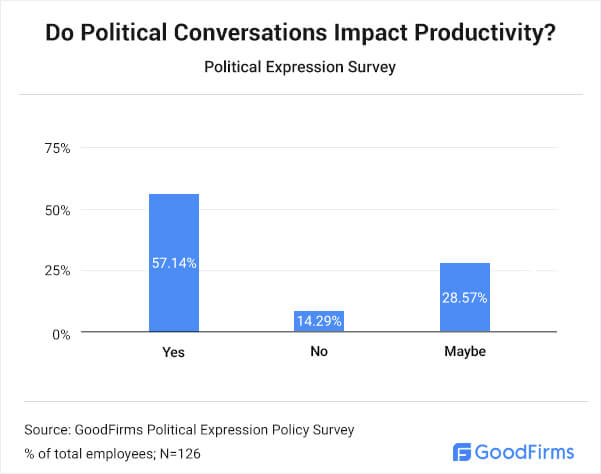
Muhammad Ammar Shahid, a digital marketing executive at Angel Jackets belongs to the group of employees who agree about the impact on productivity. “Indeed, political conversation decreases productivity to a greater extent. It shouldn't be allowed in the workplace. Instead, businesses should promote their own unique culture,” said Muhammad.
The Founder of EpicWin App, Karl Armstrong also thinks that unhealthy political discussions can affect productivity. He said, “ Company’s overall productivity is likely to be affected since unresolved issues over political expressions can harness a hostile work environment.”
Political Arguments Can Affect Customer Relations Too
The workplace environment plays a major role in the level of efficiency of employees. If an employee gets into an argument with his/her colleagues, it is only natural that the work will get affected. Now, many employees in an organization interact with the vendors/clients on a daily basis. Any unpleasant discussion at the workplace increases the chances of that reflecting in their conversation with third parties related to the organization.

65% of HR experts/management personnel feel that the risk of not having a political expression policy is that unnecessary arguments may take place. Such arguments will ultimately affect the customers/vendors facing interactions.
Anthony Babbitt, a Change Management Consult from Babbitt Consulting recognizes the impact of unnecessary political arguments in the workplace and says, “The cons are that capable, productive people can become bogged down in petty arguments unrelated to the purpose that originally brought them together. This can snowball into alienating customers and vendors, too.”
Jake Penney feels that political discussions can affect not only the customer-facing interactions but also interpersonal relations. The Head of HR at English Blinds said, “Political workplace discussions can cause arguments that affect productivity and that can bleed over into customer-facing interactions, affect how well colleagues can work together, and ultimately, are not a part of the role and so provide distractions that can cost the company money at best.”
Is a Social Media Policy Really Effective?
A social media policy states what an employee can post or not as a part of their job. People who directly monitor the activities of employees can give the best insights into the effectiveness of a social media policy.
Approximately, 55% of the HR experts believe that a social media policy is effective in maintaining a peaceful political stance.
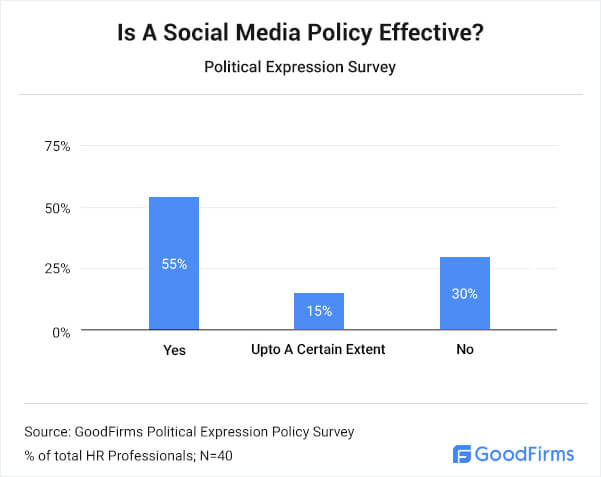
Willie Greer, founder at The Product Analyst is one of them. He says, “Social media is a platform wherein you can build or destroy something in one click, that's why it's necessary to observe rules regarding sharing political views to avoid unintentional insults.”
Daniel Pacheco, who also believes that a social media policy is effective. He said, “There’s no hiding it: the majority of political and polemical posts on social media are made during working hours. Limiting social media usage is a good way to stop your employees from getting too distracted with political discussions online and bringing them to the workplace.” He is a Communications Manager at Zety.
There are also HR experts who believe that a social media policy may be effective but upto a certain limit. It means they believe that such a policy can control social media posts but not the in-person discussions at the workplace. Of the 15% of such HR experts, one is Jagoda Wieczorek. The Manager of HR at ResumeLab said, “Social media policy can certainly limit the spillover impact, but people will talk regardless. Whether it’s “water cooler” chats, or even messaging on Slack, there is always a potential for conflict and drama between two individuals.”
Furthermore, there are about 30% of HR experts/management people that believe that a social media policy is not effective. That’s because no matter how much they try, they cannot control the activities of employees on their personal social media accounts.
Among these 30% is Jeffrey Naftal, a Human Resources Business Partner at the American Society for Microbiology. “I think a social media policy is particularly ineffective. Aside from First Amendment concerns, the ability of HR (or anyone) to monitor this and the time required would be untenable,” says Jeffrey.
Having a Political Expression Policy Can Avoid Any Unnecessary Conflicts
Every policy in a corporate setup has its pros and cons. The political expression policy is no exception. As per our research, 80% of HR experts say that the primary benefit of having a political expression policy is that unnecessary conflicts can be avoided.

Nelson Sherwin, the Manager of PEO Compare says that when a policy applies to everyone in the workplace, tense situations can be avoided. As per Nelson, “If there is a limit or an official guideline addressing political expression, applicable to everyone equally, you avoid a lot of uncomfortable and unnecessary conflicts and tense situations arising from political clashes.”
Agreeing with him is Jennifer Walden. She is the head of operations at WikiLawn. According to Jennifer, “Limiting the amount of political talk employees can engage in at work makes sure you aren't having "heated debates" out in the halls. It's very easy for people to get deeply, emotionally involved in their political stances, and it's easy to take criticism personally.”
Rex Freiberger from Gadget Review also agrees with this benefit of having a political expression policy in place. The CEO of Gadget Review says, “I think the pros of a policy like this are that it creates a set of guidelines employees can see and follow that helps divert discussion away from topics that can quickly become personal and hostile.”
Having a Political Expression Policy Promotes Respectful Work Environment
A cordial and respectful work environment can work wonders for the productivity and efficiency of employees. It is a known fact. 40% of HR experts/management personnel believe that a political expression policy will help keep the work environment respectful.
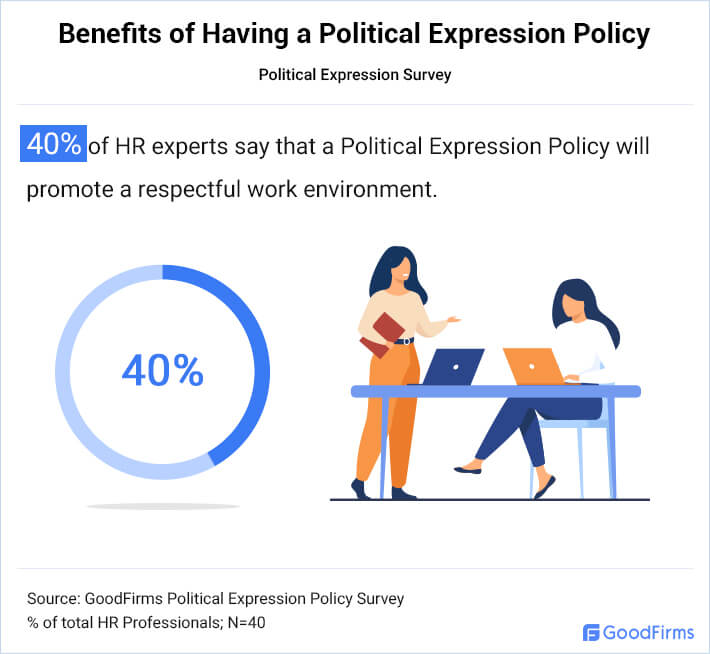
Willie Greer shares the opinion of these HR experts/management personnel. The founder of The Product Analyst states that a political expression policy will define the boundaries of political discussion. “ Political expression policy sets boundaries of discussions about political points of view. This avoids potential hostility and disrespect among workers that may damage the company's reputation,” said Willie.
Samuel Johns is an HR specialist and Hiring Manager at Resume Genius. In Samuel’s opinion, a political expression policy can help create a respectful work environment. He says, “By drafting a workplace political expression policy that ties in with a company’s anti-discrimination policy, HR specialists make it clear how political views are tied to colleagues’ identities. Such a measure promotes a more respectful workplace environment.”
The Head of Human Resources at MotionCue, Adil Ashraf thinks that with such a policy in place, respect will always be given priority. “The pros of having such a policy are that it keeps things civil at the workplace. The managers will be able to monitor the conversations so the element of respect is always prioritized,” said Adil.
But, Employees’ May Start to Consider Authorities as Too Controlling
In the modern workplace, employers need to establish policies that help regulate the workplace atmosphere. Yet, the employees should not feel that these policies are invading their personal space. As per 20% of HR experts, this is the primary disadvantage of having a political expression policy in place. There are high chances that employees don’t appreciate the monitoring of their personal social media accounts.
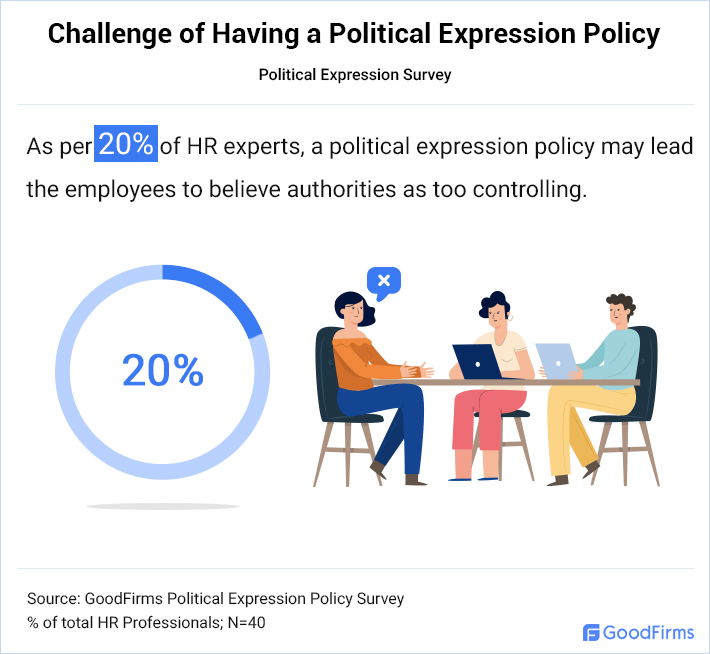
According to Tom Winter, social media policy can be misinterpreted. “The cons could include your employees perceiving you as a control freak, but you can justify this by explaining the amount of work time that can get wasted once people get into it over politics,” said Tom.
Daniel Pacheco from Zety is of the opinion that rather than putting limitations on employees, employers should focus on creating a more positive environment. The communications manager says, “Limitation of action is very difficult to apply to employees and can backfire if not done properly. One way to do it properly is to try and focus on positive and constructive things rather than negative limitations.”
Conclusion
Political discussions are a norm in workplaces. Such discussions usually happen at the workplace but sometimes their effect is seen on the social media posts of the employees. To prevent any harm to the reputation of an organization, social media policies for employees become a necessity. An organization can always get support from corporate law firms in case of such a disaster but prevention is always better than cure.
An organization can either make its political expression policy clear right during the onboarding process or state it in an informal manner later. Also, if an organization is inclined more towards a certain political ideology, then that should be stated clearly to the employees. Moreover, even though corporates have social media policies for business, regular monitoring of personal social media accounts of every employee is not feasible. If later on, something is found that contradicts the political ideology of the organization or is against the in-house policies, strict action can certainly be taken.
Table of contents
- What is Political Expression Policy?
- Most Employees Don’t Feel the Need for a Political Expression Policy at Workplace
- Employees Cite "Freedom to Express" as the Main Reason
- HR Professionals Deem the Policy as Essential for Workplace
- Impact of Political Discussions on Productivity
- Political Arguments Can Affect Customer Relations Too
- Is a Social Media Policy Really Effective?
- Having a Political Expression Policy Can Avoid Any Unnecessary Conflicts
- Having a Political Expression Policy Promotes Respectful Work Environment
- But, Employees’ May Start to Consider Authorities as Too Controlling
- Conclusion








